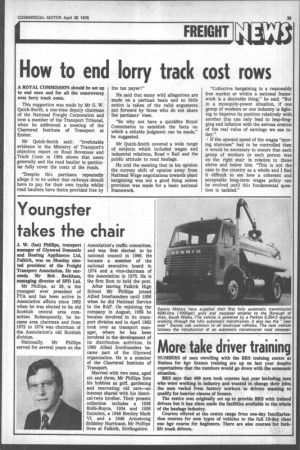How to end lorry track cost rows
Page 27

If you've noticed an error in this article please click here to report it so we can fix it.
A ROYAL COMMISSION should be set up to end once and for all the controversy over lorry track costs.
This suggestion was made by Mr G. W. Quick-Smith, a one-time deputy chairman of the National Freight Corporation and now a member of the Transport Tribunal, when he addressed a meeting of the Chartered Institute of Transport at Exeter.
Mr Quick-Smith said: "Irrefutable evidence in the Ministry of Transport's objective report on Road Revenues and ,Track Costs in 1964 shows that users generally and the road haulier in particular fully cover the costs of the roads.
"Despite this partisans repeatedly allege it to be unfair that railways should have to pay for their own tracks whilst road hauliers have theirs provided free by the tax payer!"
He said that many wild allegations are made on a partisan basis and so little notice is taken of the valid arguments put forward by those who do not share the partisans' view.
"So why not have a quickfire Royal Commission to establish the facts on which a reliable judgment can be made," he suggested.
Mr Quick-Smith covered a wide range of subjects which included wages and industrial relations, Road v Rail and the public attitude to road haulage.
He told the meeting that in his opinion the current shift of opinion away from National Wage negotiations towards plant bargaining was not a good thing unless provision was made for a basic national framework. "Collective bargaining in a reasonably free market or within a national framework is a desirable thing," he said. "But in a monopoly-power situation, if one group of workers or one industry is fighting to improve its position relatively with another this can only lead to leap-frogging and inflation with the serious erosion of the real value of earnings we see today."
• If the upward speed of the wages "moving staircase" had to be controlled then it would be necessary to ensure that each group of workers or each person was on the right stair in relation to those above and below him. "This is not the case in the country as a whole and I find it difficult to see how a coherent and acceptable long-term wages policy can be evolved until this fundamental question is tackled."
















































































































































